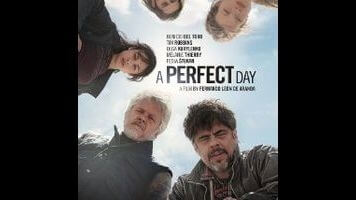The foreign-aid drama A Perfect Day is mostly just a string of anecdotes

One of the best scenes in A Perfect Day, the English-language debut of Spanish filmmaker Fernando León De Aranoa (Mondays In The Sun, Princesas), also serves to illustrate the movie’s primary shortcoming. An American aid worker referred to only as B, played by Tim Robbins, desperately needs a long coil of rope, and is trying to explain this to one of the locals (Antonio Franic). No country is specified, but the film takes place “somewhere in the Balkans” circa 1995, and B, who doesn’t speak Serbian, struggles mightily to convey his request, at one point miming the act of skipping rope as if he were playing charades. The miscommunication between the two men starts out funny and then turns poignant, as B notices a flag nearby and asks for the rope supporting it, while the soldier attempts to explain that lowering the flag, even if it’s just for a couple of hours, will surely get him killed. The only problem is that B has an interpreter (Fedja Stukan) who’s standing right next to him the entire time, and who eventually steps in and clears things up. Why didn’t he do so immediately? Because if he did, there wouldn’t be much of a scene.
That’s fairly typical of León De Aranoa’s less-than-rigorous approach to the ironically titled A Perfect Day, which chronicles roughly 24 semi-harrowing hours in the lives of four geographically diverse employees of the fictional NGO Aid Across Borders. (The film was adapted from a novel written by Paula Farías, who spent five years as the president of Doctors Without Borders in Spain.) In addition to B, the group’s wild man—we know this because he has a beard and constantly blasts rock music from his jeep—there’s Mambrú (Benicio Del Toro), the weary pragmatist; Sophie (Mélanie Thierry), the idealistic newbie; and Katya (Olga Kurylenko), a jaded Russian who happens to be Mambrú’s ex. Their task on this particular day should be relatively simple: remove a (very fat) corpse that’s been thrown into a small village’s well in order to poison the water supply. But the frayed rope Mambrú uses in his initial attempt breaks, and all subsequent efforts to retrieve the body are hindered by hostile locals and indifferent bureaucrats.
On a moment-to-moment basis, A Perfect Day is reasonably engaging, mostly because of its novel milieu—there haven’t been many films about foreign aid workers, and Farías clearly amassed a wealth of anecdotes during her time with DWB. Trouble is, it plays like a collection of anecdotes, many of which have no real bearing on the ostensible narrative. Del Toro creates the most compelling character, but Mambrú’s post-romantic squabbling with Katya keeps bogging things down; a subplot involving his tentative bond with an orphaned kid (Eldar Residovic), meanwhile, feels shoehorned in to convey some of the horrors of war, even though the conflict in Bosnia-Herzegovina was winding down at the time A Perfect Day is set. There’s also a faintly whiny undertone throughout, suggesting that the film’s primary purpose is to show how unappreciated these selfless, compassionate, and underpaid humanitarians are. Point taken, but a tribute is almost always inimical to drama. Here, León De Aranoa was forced to invent some of his own, whether it makes any logical sense or not.